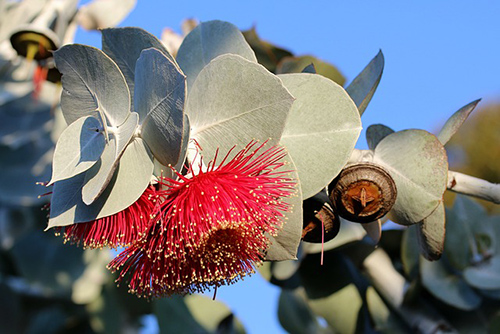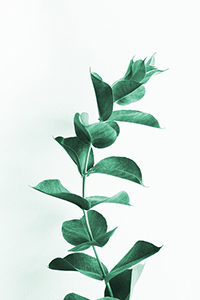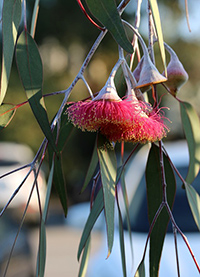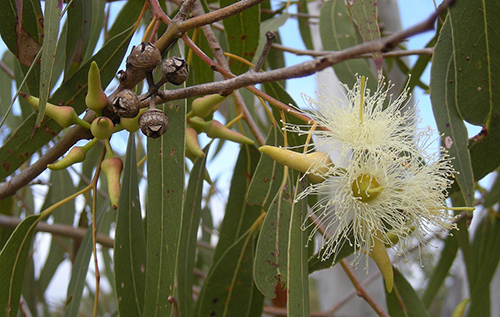Contents
In the mid-19th century, the eucalyptus plant, which grows up to 100 m high, was brought to Europe and America from Australia and Tasmania. It is one of the tallest trees, with some examples reaching 180 m high.
The Eucalyptus proliferates and absorbs a vast amount of water from the soil, thus draining marshy lands and preventing anopheles (which transmits malaria) from reproducing. However, this beautiful tree takes its toll on the soil where it is planted. It acidifies the ground and prevents other plants from growing around it.

Healing Properties and Warning
The eucalyptus plant’s leaves contain tannin, resin, fatty acids, and mainly essences in which its active components concentrate. This essence contains cineol or eucalyptol, terpene hydrocarbons, pinene, and alymphatic and sesquiterpene alcohols. This essence causes the eucalyptus’s expectorant, balsamic, antiseptic, bronchodilator, mild febrifuge, and sudorific properties.

Eucalyptus is recommended for all respiratory system disorders, especially bronchial catarrh, asthma, and acute and chronic bronchitis. Due to its antiseptic and balsamic actions on the bronchial mucous membrane, eucalyptus helps regenerate damaged cells, ease mucus expulsion, and alleviate coughs. This is one of the most effective plants known for bronchial and pulmonary afflictions.
The charcoal of the eucalyptus plant is a valuable remedy for the following cases:
- Accidental poisoning caused by toxic substances, meals in lousy condition, poisonous mushrooms, etc. It acts as a universal antidote.
- Colitis, diarrhea, dysfunctional intestinal flora, or intestinal fermentation. It adsorbs the toxin produced by pathological microorganisms, and its effects are fantastic.
WARNING! Never exceed the doses recommended for internal use (infusion and essence) since high doses may produce gastroenteritis and hematuria (blood in the urine). However, recommended doses will not have any side effects.
Eucalyptus Plant Scientific Facts

- Other names: Blue gum.
- French: Eucalyptus.
- Spanish: Eucalipto.
- Environment: Grown and naturalized in warm regions of Europe and America, in wet, marshy soils.
- Description: This tall tree grows up to 100 m high in Australia, though only 30 m high in Europe. It belongs to the Myrtaceae family, and its trunk is smooth and light-colored. It has evergreen spear-shaped leaves.
- Parts of the plant used medicinally: The leaves and the charcoal made from its wood.
How to use Eucalyptus
- Infusion with two large leaves per cup of water (20-30 g per liter). Steep for ten minutes in a covered jar. Drink three cups a day, sweetened with honey.
- Essence: Administer from four to ten drops daily.
- Vapor baths on the chest and the head, as described below.
Several Effective Uses of the Eucalyptus Plant
Vapor baths
- These are the best methods to take advantage of eucalyptus’ properties. Place a handful of eucalyptus leaves or four to six drops of its essence per liter of water in a bowl with boiling water. The person must sit down with a bare torso and head over the bowl so that the vapor reaches the chest and head. The bath should last five to ten minutes, three or four times daily. This vapor, as well as the evaporated eucalyptus essence, acts in two ways.
– Directly on the chest skin, favoring the elimination of toxins through the skin and alleviating lung congestion.
– Inhaled into the bronchi: To the antiseptic, balsamic, and expectorant properties of the essence, the mucous effects of the water vapor are added, then breaking down the bronchi mucus and easing its elimination.
Charcoal
- Charcoal has many medicinal properties, primarily because of its adsorption power. Both taken and applied to the skin, it has a remarkable ability to retain toxins, germs, and the liquid produced by inflammation. Charcoal must be finely ground to make the most effective action.
Five to ten g, dissolved in water, can be drunk four to six times a day. In an emergency, one can also directly eat a piece of charcoal. Charcoal powder and pills or capsules may be found in pharmacies.
Eucalyptus plant charcoal can be mixed with olive oil until a paste is formed. This is a traditional remedy for cleaning the digestive tract for indigestion, diarrhea, or intestinal fermentation. Charcoal has surprising results in persistent halitosis (bad breath) caused by intestinal fermentation. Take one to three spoonfuls 15 to 30 minutes before meals.

Essence against coughs
- Dissolve two spoonfuls of honey in half a glass of water, then add two or three drops of eucalyptus essence. Drink this remedy for coughs caused by pharyngitis or laryngitis (throat infections), tracheitis, bronchitis, or bronchial catarrh.
Up to five cups daily can be taken; however, the recommended dose for children should not exceed two or three cups daily.
DISCLAIMER: All content on this website is presented solely for educational and informational objectives. Do not rely on the information provided as a replacement for advice, diagnosis, or treatment from a qualified medical expert. If you are pregnant, nursing, or have any preexisting medical concerns, talk to your doctor before using any herbal or natural medicines.
REFERENCES
- George D. Pamplona-Roger, M.D. “Encyclopedia of Medicinal Plants.” George D. Pamplona-Roger, M.D. Encyclopedia of Medicinal Plants. Ed. Francesc X. Gelabert. Vols. 1 San Fernando de Henares: Editorial Safeliz, 2000. 304,305. Print. [eucalyptus plant]
- https://www.mountsinai.org/health-library/herb/eucalyptus
- https://www.healthline.com/nutrition/eucalyptus-leaves
